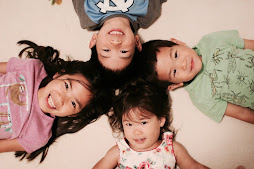I stick out a lot here because I have four kids, but I was
expecting that. Two is the average here. I get a lot of “are they twins?” about
the younger ones as apparently it would be odd for us to intentionally have four
children, or comments like v“how do you do it?” (still don’t have a great reply
for that one).
But I stick out in another way I hadn’t anticipated: people
are always surprised when they hear that I keep the younger two at home. I get
asked regularly where they go to preschool, and incredulous looks follow when I
say that they don’t.
Apparently it is rare for children to remain at home for
their earlier years here, probably due to a few factors—both parents having to
work to afford living here, or there being more highly-educated people likely
to elect focusing on their careers.
But third, and this is the part I’ve been pondering, I get
the sense people here place a higher value on early-child development: they have
such a high standard that they feel the only way to do it well is to outsource
it to the professional experts. There is a lot of talk about education
strategies and things like SEL’s (socio-emotional learning), Carol Dweck growth
mindsets, optimizing your child’s brain development and exposures by a certain
age. Combine that with a resource-rich environment and parents who either
naturally want the best for their kids or are the “Stanford-or-bust” types, and
you get competitive preschools teaching based on the latest Stanford
experiments, preschools touting specific play-oriented environments, and
lessons for little ones ranging from the typical (music, multiple languages,
sports, ceramics) to the unusual (Legos to teach political skills,
metal-working).
It’s easy to ask, how can I possibly be doing all that by
myself at home? Maybe some people are wondering, why would I want to? Why not
go do what I trained for twelve years to do, or go get some self-care, and
leave that to the experts?
I am in no way judging kids who do go to preschool (we’ll
probably find one for the three year-old next year) or lessons, but part of
adjusting to being here has been processing this sort of tension. It’s made me
realize that I do personally believe in and desire to teach them myself, in
large part because the most important things—world view, values, priorities,
principles—are taught implicitly, as they are lived out, and I want my kids to
see that from me. Maybe I’m just too sanguine and laid-back to worry overmuch
about what they are missing, though in that case it’s good to be challenged
about what and how I teach them at home.
And that’s the bottom line about living here: there are so
many things that are good, but I’m constantly having to decide when there’s too
much of a good thing, or whether that good thing in fact aligns with the gospel
and our purpose. Without that lens, it’s so easy to get sucked into a certain
way of feeling and operating, because the culture here is so strong: its values
are like a riptide that can pull you under unawares. We thought a lot of that
through before making this move, but it’s interesting to see how it plays out
in ways we do or don’t expect.


